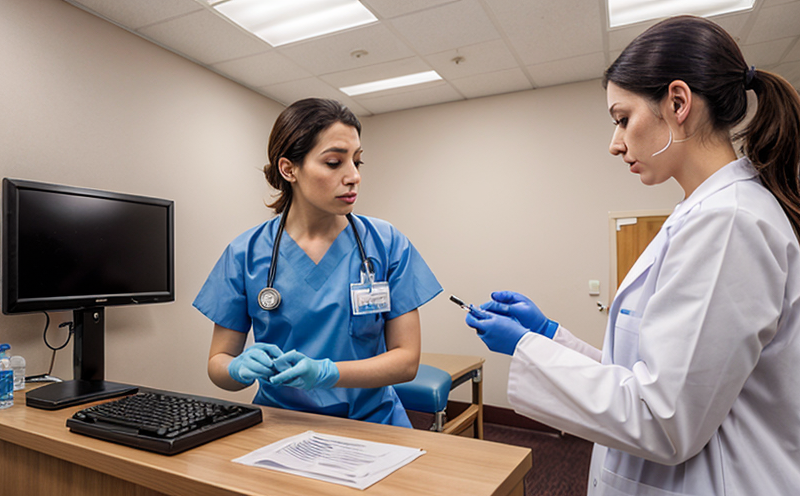Herbicide Residue Testing in Agricultural Products
In the realm of agricultural products, ensuring the safety and quality of foodstuffs is paramount. One critical aspect of this endeavor involves herbicide residue testing to safeguard public health and compliance with international regulations. Herbicides are widely used in agriculture for weed control, but their presence in final agricultural products can pose risks if not properly managed. This service focuses on detecting trace amounts of herbicides in crops and other agricultural produce, ensuring they meet strict regulatory standards.
The process begins with the collection of samples from various points along the supply chain. These samples are then prepared according to standardized protocols, which may include washing, drying, grinding, and extraction processes tailored to the type of crop being tested. Once processed, these extracts undergo instrumental analysis using state-of-the-art technologies such as Liquid Chromatography-Mass Spectrometry (LC-MS) or Gas Chromatography-Mass Spectrometry (GC-MS). These instruments provide high sensitivity and specificity, allowing for precise detection even at very low levels.
Regulatory bodies like the Food and Agriculture Organization of the United Nations (FAO), World Health Organization (WHO), and individual countries such as the United States, Europe, China, and India have established maximum residue limits (MRLs) for herbicides in foodstuffs. Compliance with these MRLs is crucial to prevent potential health hazards associated with excessive exposure to harmful chemicals.
Our laboratory adheres strictly to international standards such as ISO 17025 and has been accredited by relevant bodies worldwide, ensuring that our results are reliable and consistent. Our team of experts employs advanced methodologies and cutting-edge equipment to deliver accurate test reports within agreed timelines.
In cases where residues exceed MRLs, corrective actions must be taken promptly to address the issue before products reach consumers. This might involve additional testing, reprocessing, or even rejection of contaminated batches. By leveraging our expertise in herbicide residue testing, clients can ensure their products remain safe and compliant, thereby protecting both consumer health and brand reputation.
Understanding the intricacies of this service requires knowledge of several key factors:
- The importance of accurate sample preparation
- The role of modern analytical techniques like LC-MS/GC-MS
- The significance of adhering to international standards and local regulations
- The necessity for timely reporting and follow-up actions based on test results
With our comprehensive approach, we aim not only to meet but also exceed the expectations set by regulatory authorities. Our commitment to quality and precision ensures that every test conducted is reliable and actionable.
Why It Matters
Herbicide residue testing plays a vital role in ensuring food safety and protecting public health. Excessive exposure to certain herbicides can lead to adverse effects ranging from gastrointestinal issues to more serious long-term health problems such as cancer or reproductive disorders.
From an economic perspective, non-compliance with MRLs could result in significant financial losses due to product recalls, legal penalties, and damaged consumer trust. By implementing robust testing protocols early in the supply chain, companies can minimize these risks while maintaining high standards of quality control.
The global regulatory landscape continues to evolve, imposing stricter limits on allowable herbicide residues across different regions. Staying abreast of these changes requires ongoing investment in technology and training for laboratory personnel. Our service offers not only compliance assistance but also strategic advice on how best to navigate this dynamic environment.
Benefits
Implementing herbicide residue testing brings numerous advantages to stakeholders involved in the agricultural industry:
- Enhanced Safety: Ensures that consumers are protected from harmful levels of herbicides.
- Compliance Assurance: Helps businesses stay compliant with international and local regulations.
- Risk Mitigation: Early detection allows for prompt corrective measures, reducing the likelihood of recalls or lawsuits.
- Brand Reputation: Maintaining a clean reputation fosters trust among customers and stakeholders.
- Economic Stability: Avoiding penalties associated with non-compliance saves valuable resources.
- Informed Decision Making: Provides actionable insights that inform better business practices throughout the supply chain.
Beyond these tangible benefits, there is an intangible value in contributing positively to public health and environmental sustainability. By practicing responsible agriculture, we help create a healthier world for future generations.
Industry Applications
The application of herbicide residue testing spans multiple sectors within the agricultural industry:
- Farmers & Growers: Test crops before harvest to ensure they meet MRLs and avoid potential rejections.
- Retailers & Distributors: Verify product integrity at various stages of distribution to maintain consumer trust.
- R&D Engineers: Conduct studies on alternative pest management strategies that minimize herbicide use without compromising yields.
- Procurement Officers: Evaluate suppliers' adherence to best practices, including proper application techniques and timing.
In addition to these direct applications, the insights gained from such testing can drive innovation in sustainable farming methods. By identifying trends in herbicide usage patterns, researchers and policymakers can develop more effective guidelines that balance productivity with safety.
Our laboratory works closely with industry leaders to provide tailored solutions that address specific challenges faced by each stakeholder group. Through collaborative efforts, we contribute towards building a healthier agricultural sector for all participants.





